- Home
- Jasper Fforde
The Fourth Bear Page 14
The Fourth Bear Read online
Page 14
“Mrs. de Winter,” he murmured.
“I’m sorry?”
“Nothing. In answer to your question as to why I’m so suited to NCD work: After many years working among the nursery characters living in Reading, I have grown to have an affinity with their way of thinking. Call it intuition if you like, but there it is, and I can’t explain it.”
Kreeper’s face fell at Jack’s recovery. She thought she’d gotten him. “Nothing else?”
Jack felt his heart stop thumping and was suddenly calmer.
“Nothing at all. Tell me, what kind of parents named Kreeper give their daughter a name like Virginia?”
She scratched her chin and looked away.
“Virginia Kreeper is a plant, isn’t it?”
“Possibly. But this interview isn’t about me, Inspector.”
“You’re wrong. It’s about us, And since you have to stand in judgment of me, I think I’m entitled to know just what sort of a person I’m dealing with and where you fit into the grand scheme of things. A tall, thin, beaky appearance with colored-frame spectacles. Pointlessly aggressive, doubtlessly single and seemingly without a clue as to the proper procedure for a psychiatric evaluation. From where I’m sitting, you look like a poorly realized stereotype, a one-dimensional character without backstory or future—and a name to match your bearing and position within the bigger picture.”
It was Kreeper’s turn to be flustered. She ran a hand through her lank hair, trembled for a moment and then said, “I…I…don’t know what you mean, I’m sure. A stereotype? Bigger picture? What are you suggesting?”
“Let’s put it this way,” said Jack, suddenly feeling a lot more self-assured. “You and I have perhaps more in common than you think. And you sitting behind that desk questioning my motivations smacks of the very worst kind of hypocrisy. Essentially, you’re nothing but a vehicle for a series of bad psychiatric jokes and a plot device to stop me from getting to the truth. A threshold guardian, whose only purpose in existence is for me to circumvent—which I’m doing right now, if you haven’t noticed.”
Kreeper stared back at him, trying to adopt a bemused air of condescension to disguise her sudden nervousness.
“A one-dimensional threshold guardian? No, no, you’re quite wrong. Look, here!” She opened her purse and passed him a picture of a teenager in pigtails and wearing glasses. “It’s my niece,” she explained. “I take her out on her birthday to all kinds of places. Last year we went to the Natural History Museum. So you see I’m not poorly realized at all—I’m flesh and blood and fully in command of my own destiny—and having a recollectable past proves I’m not one-dimensional.”
She glared at him hotly, but Jack had enough experience of PDRs and incidental characters to know one when he saw one.
“What’s her name?”
“Her…name?”
“Yes. Your niece has a name, I take it?”
Kreeper blinked at him, and tears started to well up in her eyes. “I don’t know,” she said at last, breaking out in a series of sobs. “I just…don’t…know!”
Jack felt sorry for her. It can’t be easy to have your entire life summed up in a few perfunctory descriptive terms, the sole meaning of your existence just a few lines in the incalculable vastness of fiction. Still, this was his career in the balance. If he didn’t deal with her, the Jack Spratt series was likely to stop abruptly at the second volume. No third book and definitely no boxed set.
“The only question we have here,” said Jack without emotion, “is this: ‘Am I sane enough to be back on active duty?’ Do we understand each other?”
But Kreeper was in no state to say or do anything. Her shoulders heaved with silent sobs, and tears rolled down her cheeks. She buried her face in her notes and mumbled, “Why?…Why?…Why? Oh, the echoing void, the meaninglessness of it all!”
Jack looked at his watch. This was becoming tiresome, and he had a journalist to find.
“Her name’s Penny,” he said in a quiet voice, “Penny Moffat. She’s your brother Dave’s second daughter. They have another daughter called Anne, who’s at Warwick. You and Dave were brought up in Hampshire, and once, when you were six and he was eight, you fell off your bike and cut your chin. That’s how you got that scar.”
Kreeper stopped sobbing and looked up. “Penny?” she said, picking up the photograph of her niece, then gently touching the small raised scar that had suddenly appeared on her chin.
“Yes. Your brother’s wife is called Felicity, and…she’s the best friend you have.”
Kreeper’s eyes filled with tears again, but this time they were tears of joy. “She is, isn’t she?”
“Yes. Last year you all went to Cádiz on holiday. It was hot.”
“Very hot,” agreed Kreeper. “I got sunburned and had to spend the third day indoors.” She smiled to herself, then at him. “Thank you.”
“You’re welcome. So…when do you put me back on the active list?”
She dabbed her eyes with Jack’s handkerchief and took a deep breath. “If it was in my power, I’d do it here and now, Jack.”
He raised an eyebrow. “But…?”
“But the whole self-repairing car issue is a continuing subplot and completely out of my hands. The best I can do is ask you for some sort of proof the car is doing what you say it is.”
“I give you my word, Kreeper.”
She looked around and lowered her voice. “Jack, you and I both know there are bigger forces at play here. If I don’t have proof about your car, I can’t give you a clean bill of health. You know how it works. Besides, cars don’t repair themselves.”
“This one does. I bought it with a guarantee from this guy named Dorian Gray over at Charvil. Ever heard of him?”
“No.”
Jack stared at her for a moment. She was right—this was the best she could do. He snapped his fingers as an idea came to him. “Come with me.”
A few minutes later, they found themselves back in the underground garage, facing the shiny new Allegro Equipe. He showed her the oil painting of the busted-up Allegro, but she wasn’t impressed.
“So?” she said, hands on hips.
“I’ll break something on it, and you can see for yourself how it mends itself. Then you’ll understand and I’m sane, right?”
“No. I’d be as mad as you—which is the same thing, relatively speaking.”
Jack took the wheel brace from the trunk and with a single swipe took off the side mirror and put a dent in the door. The mirror fell to the ground with a tinkling of broken glass.
“Watch carefully,” he said. “The last time it happened, the whole car repaired itself from a total wreck in under a minute, so a side mirror should be a snap. Any moment now. Pretty soon. A few seconds.”
Kreeper folded her arms.
“Perhaps we shouldn’t be watching it,” mused Jack after they had stared at it for more than a minute without the car’s giving even the slightest sign of repairing itself.
“Listen, I’ve been very patient over this—”
“Just turn around, Kreeper. We have to not be watching. That’s when it works.”
Jack turned around, and Virginia reluctantly joined him.
“I’m very busy,” said Kreeper, glancing at her watch, “and if you want, we can talk about this tomorrow.”
“It’ll be fine,” said Jack. “Just give it a moment.”
They waited a minute and turned around. The mirror was still broken, the dent still showing clean and crisp in the door. Jack rubbed his head. This wasn’t going so well.
“Listen,” said Virginia, resting a friendly hand on his shoulder, “being swallowed by a wolf has probably stressed you out more than you think. You work in an area of policing that requires giant leaps of imaginative comprehension, and perhaps…well, perhaps you’ve been at it too long.”
Jack sighed. “Then I’m not back on the active list?”
“No. Concede that this whole car-mending-itself nonsense was some so
rt of bizarre fiction-induced delusion, and I’ll suggest you return to work after a three-month rest.”
“What’s the alternative?”
“I’ll recommend retirement on grounds of mental ill-health, and they’ll put you in front of a board of medics—and they’ll be a whole lot less understanding than me. It’s a good deal, Jack—in effect a paid holiday.”
She was right. It was a good deal. But he hadn’t been seeing things.
“It happened, Kreeper.”
She sighed and stared at him. “I’ll leave you to think about it for a few days. My report doesn’t have to be with Briggs until Monday next. If you change your mind,” she announced with the closest thing she had to a kindly smile, “you know where to find me.”
And she walked off, leaving Jack staring stupidly at the door mirror he had just broken off. Perhaps Kreeper was partly right. Perhaps he had been overdoing it recently. But it didn’t matter. He’d get Dorian Gray to explain the nature of his “special” guarantee and be back on the active list. He was just annoyed that his reality had been questioned twice in twenty-four hours, when no one had even suggested he was anything but genuine flesh-and-blood for over a decade. He turned and headed back toward the NCD offices, deep in thought.
“How did you get along with Virginia Kreeper?” asked Mary a few minutes later.
“Like two peas in a pod,” replied Jack sullenly, sitting down heavily on his chair, unable to shift thoughts of clean platters, beanstalks and Madeleine from his head.
“So she’s going to give you a clean bill of health?”
“Not exactly. I’ve got to visit Dorian Gray again. Did you speak to the officer investigating Stanley Cripps’s death?”
“Yes,” she replied, “I told him about Goldilocks and the ‘It’s full of holes’ message, and he was very interested. Goldilocks hadn’t come forward after the blast, and he would be wanting to speak to her once we find her.”
“It won’t be the first time a reporter has committed the sin of omission,” mused Jack, dialing Dorian’s number only to receive the “disconnected” tone.
“I’ve found several links between these explosions,” said Ashley, waving the folder.
“You have?” said Jack excitedly. “What are they?”
“They all happened to humans—except the one in the Nullarbor Plain, which happened to sand.”
“Inspired. Anything else?”
“They all occurred on the planet Earth, the addresses all had an A in them, they all happened during the day except Obscurity, none of them occurred in Antarctica, each was within a thousand miles of human habitation, all of them—”
“Any useful links? Like something Katzenberg, Prong and Cripps had in common.”
“Aside from them all being killed in unexplained explosions?”
“Yes.”
Ashley consulted his list for a moment. “No. Not a single one. By the way,” he continued, “I’m still waiting for Bart-Mart to get back to me, and Goldy’s car hasn’t been reported abandoned or anything.”
“Thanks.”
“And Agatha Diesel dropped in to say hello while you were both out.”
“Did she?” said Jack, making a face. “What did she want?”
“It was most odd,” said Ashley thoughtfully. “She said she wanted to talk to you about a charity benefit in aid of distressed gentlefolk she was planning, but I think she just wants you to put your—” He stopped, looked at Mary, gave a shrug and then placed a single sucker digit on Jack’s forehead.
“Yes, you’re probably right,” agreed Jack after a moment, “and most graphically realized, too.” He pushed away Ashley’s digit, which detached with a faint pop. “And please, don’t do that mind-merging stuff on me, okay?”
“Sorry. Do you find it intrusive?”
“Not at all—it’s just that I can see what you’re thinking in the background.”
“Oops,” gulped Ashley, flicking a look toward Mary, who thankfully wasn’t paying much attention. “Right you are, then.”
The phone rang.
“Spratt, NCD…”
It was Briggs, so Jack just carried on talking.
“…isn’t in right now, but if you’d like to leave a message when you hear the tone, please do so…. Beeeeep.”
“That old pretending-to-be-an-answering-machine stuff doesn’t fool me, Spratt,” said Briggs angrily.
“Sorry, sir.”
“What are you doing in the office?”
“I was with the quack for my psychiatric evaluation, sir. I just popped in to brief Mary about the Rumpelstiltskin parole hearing.”
“Hmm. Well, put her on.”
He handed the phone to Mary, who listened for a moment and then said, “Yes, sir, I was very impressed you didn’t fall for the answering-machine gag.”
She looked up at Jack, who made a sign for her to call him and then crept out the door. Briggs had been known to walk around the building on a cell phone pretending he was in his office, and Jack had just about had his fill of threshold guardians for the day.
Jack walked down to his car and noticed that the door mirror had mended itself in his absence. He drove out of the garage, meaning to visit Dorian Gray and have a word with him in person. He’d called him several times, but had continued to get the “number disconnected” tone.
A few miles down the road, and after the brief annoyance of a military checkpoint looking for the Gingerbreadman, Jack’s cell phone rang.
“I’m going home to watch Columbo, sir,” he said without waiting to hear who it was. “Oh, sorry, Mary—what’s up?”
He slowed the car as he listened, then pulled into a lay-by.
“Excellent,” he said at last. “I’ll meet you at the northern entrance in twenty minutes.”
He tossed his phone onto the passenger seat, signaled and pulled out into the afternoon traffic, heading rapidly off in the direction of Andersen’s Wood. As he did so, he noticed for the first time that the odometer on the Allegro was going backward—and the fuel gauge was still on the three-quarters mark. He shrugged. Clearly a glitch of some sort.
15. Three Bears
Largest unmapped area in the United Kingdom: There are several areas of the UK that still defy any serious attempt at cartographic interpretation, but the largest by far is Andersen’s Wood, a six-thousand-acre tract of forest to the southwest of Reading, Berkshire. The heavy oak canopy defeats conventional aerial photography, and cartographic expeditions have known to become hopelessly lost, sometimes for weeks. A quick glance at the ordnance survey map of the area reveals only an irregular area of green with the legend, “Here be trees.”
—The Bumper Book of Berkshire Records, 2004 edition
Andersen’s Wood was remarkable not only for its mature hardwood but for its isolation. Apart from one narrow asphalt road running north to south there were no roads at all, just unmarked logging tracks meandering around the ancient woodland. It wasn’t unusual for people to become lost while walking through its leafy trails, and there were even rumors of a dilapidated and forgotten castle hidden somewhere within its heavy canopy, protected by an almost impenetrable wall of brambles.
Mary was waiting for Jack when he arrived outside the northern entrance to the wood, and she jumped into his car as soon as he pulled up.
“So what have we got?” he asked.
“Cell phone records,” she replied. “She had a ‘number blocked’ call at 6:04 A.M. on Saturday morning that she answered. There was another one at 9:56 that she didn’t, and several of the same all through the afternoon. Josh Hatchett’s home number calls her that evening and at regular intervals throughout the next five days. Seventy-six calls in total and about half with number withheld. None of them were answered.”
“Quite a few people withhold their numbers,” mused Jack, “but her last answered call was the Saturday 6:04 one?”
“Yup. From there we can track her cell phone as it began to move a half hour later. It crossed eight coverage ce
lls until it stopped in Andersen’s Wood at 7:32. The signal faded three days later, probably as a result of a dead battery.”
“That doesn’t really help us,” murmured Jack. “Towers are few and far between in the country, and cells can get pretty big—it will be like looking for the proverbial needle.”
“We got lucky,” said Mary. “In the three days Goldy’s phone was doing nothing but firing off the occasional ident, it switched to another cell and back again six times.”
“It was moved?”
“I don’t think so.”
She showed Jack a local map that had been faxed from Goldilocks’s phone company with two intersecting polygons sketched upon it.
“Goldy’s phone was at the boundary of a cell, and the ident was bounced back and forth between two masts; by looking at where the cells potentially share coverage, we can get a vague idea of where her phone is.”
She showed him the approximate overlap of the two irregular cells and pointed to an area less than eight hundred yards wide and about three hundred deep that fell in a sector on the western side of the wood.
“Let’s just hope,” said Jack, “she’s still got her phone with her.”
Jack started the car and drove slowly into the arboreal charm of the wood. He had often come here for picnics when a child, and its ancient splendor was one of Berkshire’s three jewels, along with the Sacred Gonga and Castle Spongg.
They drove slowly down the main road and then took a graveled logging track, with Mary navigating—or trying to. She got them lost at least twice before they turned a corner and Jack abruptly stopped the car.
“Bingo,” he breathed.
“Gotta love those cell-phone records,” replied Mary.
Sitting by the side of the road and dappled with the sunlight filtering through the trees was an immaculate Austin Somerset in all its 1950s curvy, pressed-steel glory. The color was green and the registration 226 DPX. It was Goldilocks’s car.

 First Among Sequels
First Among Sequels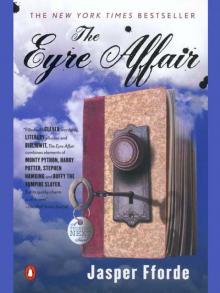 The Eyre Affair
The Eyre Affair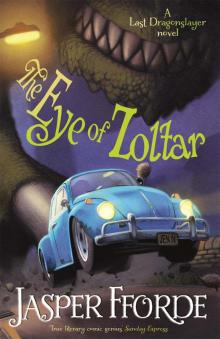 The Eye of Zoltar
The Eye of Zoltar The Woman Who Died a Lot
The Woman Who Died a Lot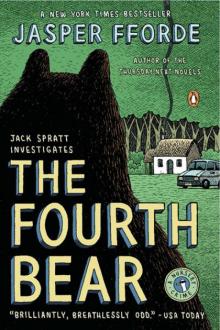 The Fourth Bear
The Fourth Bear Lost in a Good Book
Lost in a Good Book Something Rotten
Something Rotten The Well of Lost Plots
The Well of Lost Plots The Big Over Easy
The Big Over Easy The Constant Rabbit
The Constant Rabbit The Last Dragonslayer
The Last Dragonslayer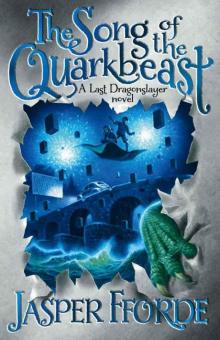 The Song of the Quarkbeast
The Song of the Quarkbeast One of Our Thursdays Is Missing
One of Our Thursdays Is Missing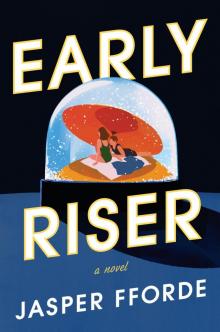 Early Riser
Early Riser Early Riser_The new standalone novel from the Number One bestselling author
Early Riser_The new standalone novel from the Number One bestselling author Something rotten n-4
Something rotten n-4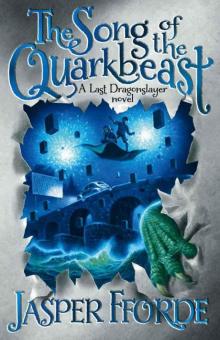 The Song of the Quarkbeast tld-2
The Song of the Quarkbeast tld-2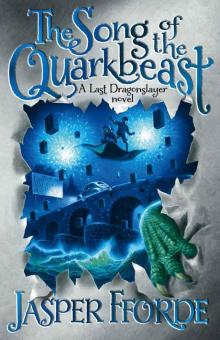 The Song of the Quarkbeast: Last Dragonslayer: Book Two
The Song of the Quarkbeast: Last Dragonslayer: Book Two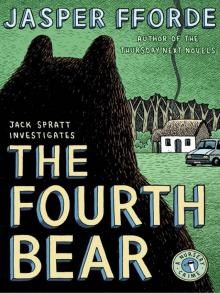 The Fourth Bear nc-2
The Fourth Bear nc-2 Lost in a Good Book tn-2
Lost in a Good Book tn-2 The Well of Lost Plots n-3
The Well of Lost Plots n-3 Thursday Next in First Among Sequels
Thursday Next in First Among Sequels First Among Sequels tn-5
First Among Sequels tn-5 The Eyre Affair tn-1
The Eyre Affair tn-1